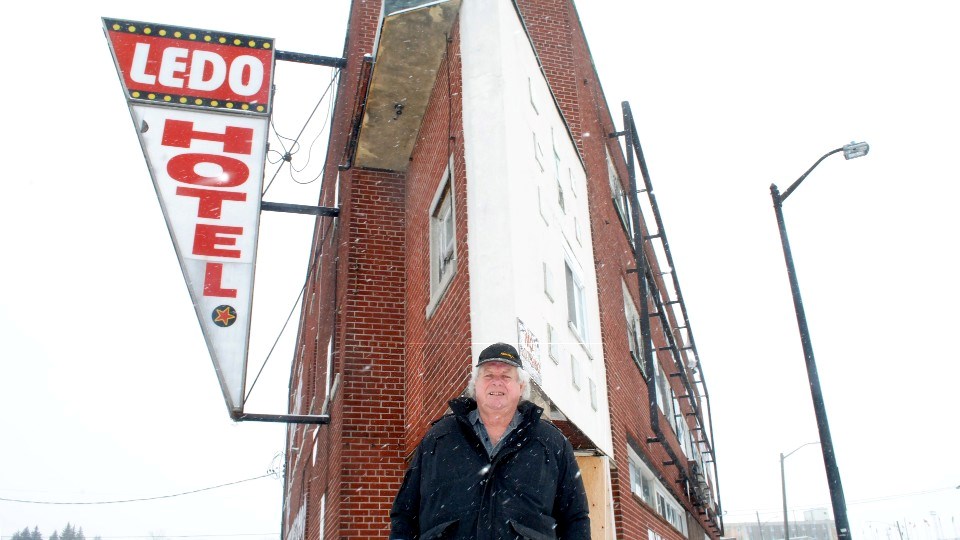The Le Ledo project is dead, but the owner of the Ledo Hotel property originally slated to house the development said there’s still plenty of potential in the 70-year-old building.
George Soule’s latest plan for the downtown Sudbury structure is for it to be renewed as affordable housing. This would bring it back in line with how it was used until an Ontario Fire Marshal Immediate Threat to Life Order forced its immediate closure in 2020.
A few hours after Sudbury.com reached out to Le Ledo Inc. director of development and marketing Greg Oldenburg for comment on Monday, the organization issued a media release.
In it, they cite several points of uncertainty as reasons for backing away from the project, including:
- Ward 11 Coun. Bill Leduc’s motion to have staff investigate the implications of putting the Junction East project on pause, which city council has yet to consider and is on tonight’s agenda.
- An Ontario Provincial Police racketeering investigation related to the Kingsway Entertainment District and an alleged bribery attempt related to city council’s site-selection decision.
- Other lingering points of uncertainty and mixed messages regarding the Junction East and Junction West projects in the area, which the project was intended to build off of.
“It is not commercially reasonable for Le Ledo to continue to the next stage of the project until the entire scope/schedule of Sudbury Library and Art Gallery is confirmed to be moving ahead,” they wrote. “We no longer have an active agreement with the vendor despite spending +$100,000 on environmental assessment, rendering/plans, (Municipal Property Assessment Corporation) assessment, geotechnical reports and time associated with the venture.”
They also note that based on a $50-million value, 120 hotel rooms and 50,000 square feet of commercial, event and hospitality space, the project would have generated $600,000 per year in new municipal taxes and nearly $100,000 per year toward the downtown Business Improvement Area to support downtown projects.
With the project dead as far as he’s concerned, Soule said that affordable housing makes sense for the building.
“We need all the housing we can get,” he said, adding that the building could easily accommodate 27 units in short order and an additional 20 or so within two years, and “for a lot less than I’ve seen with other projects.”
“It could be done quite reasonably,” he said. “It’s a sound building, its location is perfect.”
Although the building’s previous life as affordable housing didn’t end well, Soule said he plans on having a proper management and security staff in place this time around to prevent it from becoming overrun by squatters.
Soule has owned the Ledo Hotel building since 2007 and previously rented out rooms on a month-to-month basis. At first, he said he was able to rent out enough units to pay for the building, but that its clientele degraded over the years.
“There was a real demand for it,” he said, adding that addictions weren't as great an issue at the beginning as they became during its final years.
By the end, he said he was renting out approximately 12 units, eight to clients who were still paying rent, and that 20 to 30 additional people were squatting in the building.
A fire in October 2020 contained to a single unit drew the attention of firefighters, which resulted in the building becoming closed to occupants. In its decision, the Office of the Fire Marshal cited a water leak from the roof that was continuously running through a live electrical panel, an unsecured electrical room with high voltage wiring exposed, a fire alarm system that was inoperable due to a water leak and electrical to the building being disconnected.
The closure came around the same time as the Le Ledo Inc. project began taking shape, which proposed a $50-million redevelopment of the site. As such, Soule said it was good timing to keep the building vacant rather than remedy its issues.
The Le Ledo Inc. proposal reimagined the property as a 150,000-square-foot commercial development with a combination of existing uses and others allowable within the C-6 commercial zoning. The existing building would be integrated into the project alongside a new 14-storey tower clad in copper and glass.
Soule said the project dragged on and died as a result of its proponents lacking the funds required to see it through. He expects to see his greatly scaled-back effort begin accepting tenants into affordable housing units as early as a year from now.
He is starting out by applying for Canada Mortgage and Housing Corporation seed funding, while Leduc is helping him apply for various streams of municipal funding, including the Community Improvement Plans and Incentive Programs.
Depending on what comes out of these early days of planning, he said it might take the form of transitional housing similar to the complex for the chronically homeless the city has planned for Lorraine Street, which received $7.4 million in Canada Mortgage and Housing Corporation funding.
Unlike that location, Soule said he doesn’t anticipate seeing any area residents complain about his downtown proposal. People experiencing homelessness are already residing outdoors in the area, he said, and affordable housing at the Ledo Hotel building would only improve things.
As the building stood yesterday, its main floor has been largely gutted to accommodate a film shoot. Included in the various piles of debris strewn about was a bag full of copper pipes as a result of an attempted theft of material pulled from the walls.
Soule walked Sudbury.com up to the building’s third floor to view one of the building’s good units, which he said is a better indication of what the balance of the building will look like in the event his vision for affordable housing comes to fruition.
The unit consisted of a small multipurpose living space, including a bed, sink, small refrigerator and a microwave. It also included an adjoining washroom.
Tyler Clarke covers city hall and political affairs for Sudbury.com.
